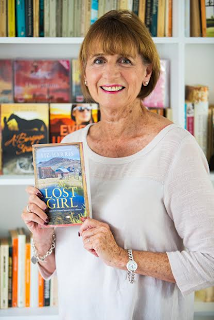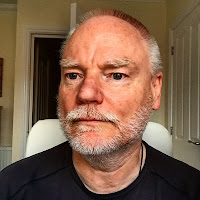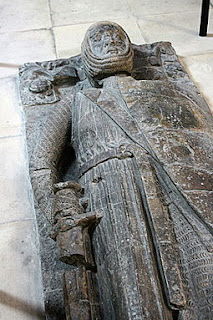Louise has very kindly offered a signed copy and an ebook of her memoir, Future Confronted. To be in with a chance of winning, please leave a comment at the bottom of the page. If anyone would prefer to leave a comment on Facebook, they can follow this link to our Facebook page
Although I have known Louise online for quite a long while, I met her for real for the first time at HNS16 - the Historical Novel Societies conference that was held this year in Oxford. Louise is a lovely lady and I could have sat and talked to her all day, but various activities tugged us in different directions, though not before I had asked her a few questions.
*
I am sure that you
are tired of being asked the usual questions that would be interviewers ask
authors, so hopefully this interview is an interview with a difference and I
have come up with some unusual questions!
If your latest
book Future Confronted was adapted into a TV show or a film, who would you like to play the lead
role?
Ummm, well, the book is about my
son, Rob, who had blonde hair and a ginger goatee beard, and thinking about
anyone playing him is a bit weird. But, if I really had to choose, then the
lead role would probably have to be Brad Pitt. He doesn’t look like my son, and
he’s too old, but I like him… a lot, so it’s a pure indulgence.
(Note from Diana: Hmmmmm.... good choice!! Good taste!!!)
*
If, as a one off,
(and you could guarantee publication!) you
could write anything you wanted, is there another genre you would love to work
with and do you already have a budding plot line in mind?
What a great question! I would love
to write a time-slip novel. I don’t have a plot line in mind, but it would
definitely be set in Scotland, probably between the 14th and the 19th
century.
*
Do you have any
rituals and routines when writing? Your favourite cup for example or ‘that’
piece of music...??
Absolutely, yes! I always have music
playing. I like to play music that fits the scene that I am writing, where
possible, of course. Film scores are good for this. Or if I am writing a sad,
or devastating scene, then I like Mozart, or Vaughan Williams.
Now, as for a favourite cup, that
really depends on what I’m drinking. If it’s tea with lemon, then it will be my
red cup (I love red) with white polka dots. If it’s a latte, then it will be my
tall tapered glass cup with my Nespresso coffee. But if it’s a difficult scene,
or I am reading through, then it’s a milky coffee in my large, white cup, which
holds half a pint. I think it’s true to say that I love coffee a wee bit more
than tea.
*
What is the worse book you have ever read? What made it unreadable for you?
The worst book? I don’t know that I
have read a really ‘bad’ book, per se, but I have read a book that was so full
of woe, it was beyond depressing. I had to read it at university, and write a
5000 word paper on it. The title was The
Yellow Wallpaper by Charlotte Perkins Gilman. It is about a woman with a
“nervous weakness” as it is referred to in the book, and true to the title, it
is about how the protagonist sees the yellow wallpaper in the room which she is
occupying. There is much said about the recurring pattern, I quote, “There is a recurrent spot where the pattern
lolls like a broken neck and two bulbous eyes stare at you upside down.” I
don’t know about you, but if I were in a room with that wallpaper, I think that
I would have a “nervous weakness”. Even the description of the wallpaper is
morbid.
*
Other than writing
full time, what would be your dream job?
Oh fabulous question! I’d love to be
on a film set, either behind the cameras as one who sees to the continuity of
each take, or as an extra. I love everything to do with the making of films, it
is such a fascinating process. The idea of making worlds so that an audience
can be transported… well, it really appeals to me. Back in the day, there was
no such thing as ‘blue screen’ or ‘green screen’ filming, so CGI now plays a
huge part in the making of many films and TV series, making the possibilities
just endless. Love it!
*
Coffee or tea? Red
or white?
Coffee, absolutely, coffee. It’s my
first drink of the day.
*
I’m teetotal. But at Christmas I will have a small glass of red wine
diluted with lemonade. I know all the drinkers out there will be screaming that
it is a heresy to dilute any alcoholic
drink, but there you go, that’s the way I roll.
*
If you had free choice over the font your book is printed in, what font/fonts would you choose?
The short answer is that I prefer
Calibri.
(Note from Diana: I love Calibri and
also Plantagenet Cherokee.)
*
Imagine that you
could get hold of any original source document. What would it be?
*Rubs hands together* Oh fabulous! I
would love to get hold of the original manuscript of Paradise Lost by John Milton. I did get a lot of source material
from the British Library on John Milton, as I wrote about Paradise Lost vs Genesis
in the Bible, for my dissertation. I absolutely love how his mind worked, a
very, very clever man. Just to see, and maybe touch, that manuscript would be
the best of days.
*
Historical fiction
authors have to contend with real characters invading our stories. Are there
any ‘real’ characters you have been tempted to prematurely kill off or ignore
because you just don’t like them or they spoil the plot?
I’m writing my first historical
fiction book at the moment. It has at its core, the death of Alexander III. So,
I already have a real character’s death. I don’t think that there are any
‘real’ characters that I would like to kill off, or ignore. The history of the
time in which I am writing is so fascinating. One of my characters, on the
other hand, I would dearly love to kill off, but every time I think, now you
are for the chop matey, he still hangs around. His day will come.
*
Are you prepared
to go away from the known facts for the sake of the story and if so how do you
get around this?
Interesting. It’s not something that
I would set out to do. Generally, it peeves me when I come across this, even
with the Author’s Notes to explain why. In my book, the facts, as known, about the
death of Alexander III, have him falling over the cliff to his death, along
with his horse. There is much debate as to whether that is exactly what
actually happened, so I am following ‘that’
argument in my story. No spoilers, though, sorry.
*
Do you find that the
lines between fact and fiction sometimes become blurred?
Yes, I am sure they very often are.
After all, history is written with hindsight, and not as it actually happened.
It is also someone’s point of view, how they saw it. There is a book that I
read, can’t remember the title, but it revolved around one incident which was
seen by several people. Each person was asked to write down an account of what
they had seen, and each recollection was different, although the central core
was the same. So for me, where the facts are truly known, that’s wonderful,
but, yes, I do believe that fact and fiction do, most definitely become
blurred, and for a writer that can only be serendipitous.
*
Have you ever
totally hated or fallen in love with one of your characters?
I hate to admit this, but yes. Maybe
“fallen in love with” is too strong a thought, but most certainly very fond of
one of my characters. Another of my characters, whom I detest with a passion,
just will not go… yet. But he will.
*
What do you enjoy reading for pleasure?
I really enjoy reading both historical
fact, and fiction, and would gladly read them all day, every day. I love the
idea that the past can be brought to life through someone’s imagination, you
know, breathing life into the long-dead, it’s like alchemy.
*
What drink would
you recommend drinking whilst reading your latest book?
My latest book? For me
it would be coffee, definitely, coffee. For the reader? Well, that is a loaded
question. So I would have to say whatever their favourite drink happens to be.
*
Last but not
least... favourite historical author?
Oh, that is so not a fair question!
Many of the authors that I love are my friends, either personal, or on
Facebook, and Twitter. They all write so well, so thoroughly, and
conscientiously, that I would hate to choose one over the other. There are
those authors of whom I do not know, but admire from afar, as it were. I have
to say, though, that it would like choosing which one of your children is your
favourite. Can’t be done.
(Note from Diana: Yep! I'd have the same problem myself!!)
About Louise Rule: I have been married to Dave for 47 years, and we have raised a wonderful family together. We had three sons, now two surviving. We have five grandsons, being two sets of twins to one son, and a singleton to the other. My family are my absolute joy, and keep me sane, and sometimes make me insane! What can I say….? They’re my family!



















